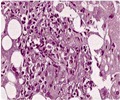A new study has found that fever can briefly improve the behaviour of children with autism.
A new study has found that fever can briefly improve the behaviour of children with autism.
The researchers presume that this happens because fever restores nerve cell communications in regions of the autistic brain.As a part of the study, 30 autistic children between ages 2 and 18, who were observed during and after a fever of at least 100.4 degrees Fahrenheit.
More than 80 percent of the children showed some improvement in behaviour during a fever and 30 percent showed significant improvement, researchers said. Behaviour changes included longer concentration span, increased amount of talking and improved eye contact.
The study was written by Craig J. Newschaffer, Ph.D., professor and chair of the Department of Epidemiology and Biostatistics at Drexel University, and Laura K. Curran, Ph.D., an epidemiology doctoral degree graduate who Newschaffer advised before he joined Drexel from Johns Hopkins University.
“Any leads that suggest new biologic mechanisms that could be acted on through treatment are welcomed,” Newschaffer said.
Study data suggest that behaviour changes may not solely be the by-product of sickness and, consequently, could be the by-product of a biologic response to fever.
Advertisement
Autism can limit social interactions and disable verbal and nonverbal communication. About 1.5 million Americans have some form of autism, according to the Autism Society of America. The cause of autism is unknown.
Advertisement
Source-ANI
LIN/P











